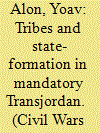| Srl | Item |
| 1 |
ID:
146062


|
|
|
|
|
| Summary/Abstract |
Men make their own history, but they do not make it as they please; they do not make it under self-selected circumstances, but under circumstances existing already, given and transmitted from the past. The tradition of all dead generations weighs like a nightmare on the brains of the living. And just as they seem to be occupied with revolutionizing themselves and things, creating something that did not exist before, precisely in such epochs of revolutionary crisis they anxiously conjure up the spirits of the past to their service, borrowing from them names, battle slogans, and costumes in order to present this new scene in world history in time-honored disguise and borrowed language.
|
|
|
|
|
|
|
|
|
|
|
|
|
|
|
|
| 2 |
ID:
075016


|
|
|
|
|
| Publication |
2006.
|
| Summary/Abstract |
Since its establishment the Hashemite Dynasty in Jordan has enjoyed the support of the Jordanian tribes. In a unique historical process, the tribes were integrated into the modern state structure and developed an interest in the very existence of the state and its regime. Despite the significance of this process, the roots of these exceptional relations between the tribes and state have been insufficiently explored. This article evaluates the tribes' response to state-formation processes during the formative years of the British mandate when the prospect of violent internal dissent was ever present. Contrary to the accepted scholarly understanding that in the early 1930s the central government already achieved the tribes' absolute surrender, this article shows that the tribes' integration was a long, dynamic process, which began with the formation of the Emirate of Transjordan in 1921 and continued well into the 1940s. The main argument is that even with the consolidation of the government's authority, the government did not achieve full control over the tribes, which remained a powerful force. Whereas the tribes benefited from governmental initiatives and played a role in the process of state-building, they opposed any attempt to constrict their autonomy. Though changed through this process, the tribes succeeded in preserving their influence to a greater degree than hitherto acknowledged in the current literature.
|
|
|
|
|
|
|
|
|
|
|
|
|
|
|
|